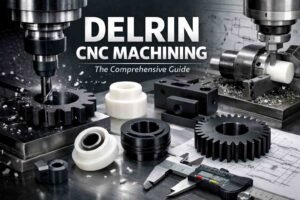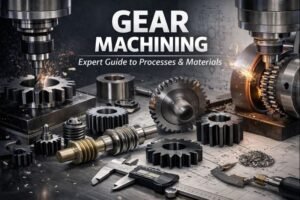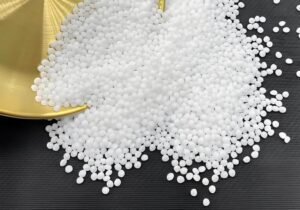The automotive industry relies heavily on precision manufacturing, with over 70% of vehicle components being produced using injection and stamping molds. As a result, the quality of these components is crucial to the overall performance and safety of modern vehicles.
You are likely aware that the demand for high-quality automotive parts is on the rise, driven by the need for fuel efficiency and performance. Precision molds play a critical role in meeting this demand by enabling the production of complex components with consistent quality and performance.
The Critical Role of Precision Molds in Modern Automotive Manufacturing

Precision molds have revolutionized the automotive manufacturing process. They enable the mass production of complex parts with consistent quality.
Precision molds have become indispensable in automotive manufacturing, meeting stringent requirements for weight reduction, fuel efficiency, and safety standards.
The economic benefits of precision molding include reduced material waste and lower manufacturing costs.
Precision molds facilitate the integration of multiple components into single parts and enable the use of advanced materials.
Understanding Precision Molds for Automotive Applications
Precision molds are essential for producing complex automotive parts with high accuracy. The automotive industry relies on these molds to manufacture a wide range of vehicle components, from interior parts to structural elements.
Injection Molding Technology in Vehicle Production
Injection molding technology is a critical process in vehicle production, allowing for the creation of complex geometries and the incorporation of multiple materials. This technology is particularly suited for automotive applications due to its ability to maintain tight tolerances and produce high-quality parts.
Stamping Dies and Their Automotive Applications
Stamping dies play a vital role in automotive manufacturing, particularly for sheet metal components and structural elements. They enable the production of high-strength, lightweight parts that are essential for modern vehicles.
The combination of injection molding and stamping technologies allows for the production of a wide range of automotive parts, from interior trim to critical structural components. Understanding the design considerations for these molds, including material selection, gate design, cooling systems, and ejection mechanisms, is crucial for optimizing their performance.
Modern CAD/CAM technologies and simulation tools have significantly improved the design and performance of precision molds for automotive applications. These advancements enable manufacturers to create complex parts with high precision and reliability.
How Precision Molds Enhance Vehicle Component Quality
Achieving high-quality vehicle components relies heavily on the precision of the manufacturing molds. Precision molds directly impact the quality, consistency, and performance of automotive components through tight tolerance control.
Achieving Tight Tolerances for Critical Parts
Tight tolerances are crucial for critical automotive parts, especially in safety-critical systems. Advanced mold technologies help overcome the challenges of achieving and maintaining these tight tolerances in high-volume production.
Material Optimization for Performance and Durability
Material selection and optimization in the molding process significantly affect the durability, strength, and weight of automotive components. Precision molds enable the use of advanced materials like high-performance polymers and composites.
Quality control processes, including in-mold sensors and real-time monitoring, ensure consistent part quality. Precision molding contributes to extended component lifecycles and improved vehicle reliability through material optimization.
Engine System Components: Precision Molding Applications
Precision molding is essential for producing high-quality engine system components. These components must withstand extreme temperatures, pressures, and chemical exposure, making precision molding a critical process in their production.
Fuel Delivery System Components
Fuel delivery system components, such as fuel pumps and injectors, require precise molding to ensure reliability and performance. The use of advanced plastic materials in injection molding enhances the capabilities of these components.
Engine Housing and Support Structures
Precision molding enables the production of complex engine housing components with integrated features. This process supports the production of high-quality products and contributes to the overall efficiency of engine systems, demonstrating the value of precision molding in modern automotive work.
Transmission and Drivetrain: The Role of High-Precision Molds
High-precision molds play a crucial role in the manufacturing of transmission and drivetrain components, enabling the production of complex parts with tight tolerances. As a customer, you understand the importance of meeting specific needs in automotive manufacturing, where precision and quality are paramount.

Gears and Mechanical Components
Modern transmission systems increasingly rely on precision-molded polymer and composite gears, bearings, and other mechanical components to reduce weight and noise. The use of injection molding technology allows for the creation of complex geometries that would be difficult or impossible to achieve with traditional manufacturing methods.
Housing and Protective Elements
Precision molds enable the production of complex transmission housings with integrated features, reducing assembly time and improving reliability. Additionally, protective elements like seals, gaskets, and covers are critical in transmission systems, and precision molding ensures their proper function, safeguarding the parts and enhancing overall system durability.
As the automotive industry evolves, particularly with the rise of electric vehicles, new opportunities and challenges emerge for precision-molded components. Electric vehicle drivetrains require innovative solutions, especially in power electronics and battery integration, where high-precision molds can meet the demanding customer needs for performance and efficiency.
Interior Vehicle Components Manufactured with Precision Molds
The interior of a vehicle is not just about aesthetics; it’s also about functionality, and precision molds play a crucial role in achieving this balance. You benefit from the advanced technology that enables the production of high-quality interior components.
Dashboard and Control Elements
Precision molds are used to manufacture dashboard assemblies, control panels, and other critical interior components. These molds enable the integration of multiple functions into single units, reducing assembly time and improving the overall fit and finish of your vehicle’s interior.
Comfort and Safety Features
Precision molding also contributes to the production of comfort and safety features such as climate control systems, seating mechanisms, and acoustic insulation. You enjoy a safer and more comfortable driving experience thanks to the precision-molded components that are designed to meet stringent automotive standards.
By utilizing plastic injection molding, manufacturers can produce complex interior components with precise details, enhancing both the aesthetic appeal and functionality of your vehicle’s interior. The use of precision molds in the project ensures that the final products meet the required standards for quality and performance.
Exterior Body Parts: Combining Aesthetics with Functionality
The exterior body parts of a vehicle play a crucial role in both its aesthetic appeal and functional performance. You need exterior components that not only enhance the vehicle’s appearance but also improve its aerodynamics, safety, and overall efficiency.
Precision molds are essential for creating these exterior body components. They enable the production of complex shapes and designs that meet the dual demands of style and functionality.
Aerodynamic Components and Panels
Aerodynamic components, such as front air dams, spoilers, and underbody panels, are critical for improving a vehicle’s fuel efficiency and performance. You benefit from precision-molded components that are designed to reduce air resistance and enhance the overall aerodynamics of your vehicle.
Lighting and Sensor Housing Systems
Modern lighting systems rely on precision-molded components for housings, lenses, and reflectors that must meet strict optical and thermal requirements. Additionally, the increasing integration of sensors into exterior components for driver assistance systems and autonomous driving requires precision molds that can accommodate these technologies.
By utilizing precision molds, manufacturers can achieve consistent thickness, surface quality, and dimensional stability in large exterior panels. This consistency is crucial for ensuring the overall quality of the vehicle’s exterior body parts.
IATF 16949 Certification: Meeting Stringent Automotive Standards
The importance of IATF 16949 certification lies in its ability to ensure that automotive manufacturers meet the stringent quality expectations of global OEMs. This certification is a benchmark for quality management in the automotive industry.
Quality Management Requirements for Automotive Suppliers
To achieve IATF 16949 certification, automotive suppliers must implement a robust quality management system that adheres to stringent requirements, including process control, product development, and continuous improvement. This involves rigorous documentation, testing, and validation processes.
How Certification Benefits End Products and Manufacturers
IATF 16949 certification benefits both end products and manufacturers. For end products, it ensures improved reliability, performance, and safety. For manufacturers, it leads to preferred supplier status, improved processes, and reduced warranty claims, ultimately meeting the high-quality expectations of global automotive OEMs.
Conclusion: Partnering with Fecision for Automotive Manufacturing Excellence
Fecision’s expertise in precision molds transforms automotive manufacturing. Our IATF 16949 certification demonstrates our commitment to quality. We collaborate with OEMs and tier suppliers to improve component quality and implement new designs. With advanced equipment and technical expertise, we deliver high-quality components. Contact Fecision today to explore partnership opportunities and drive innovation in your vehicle components.




